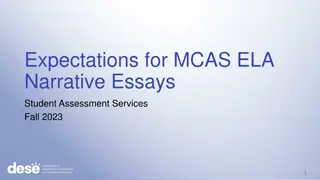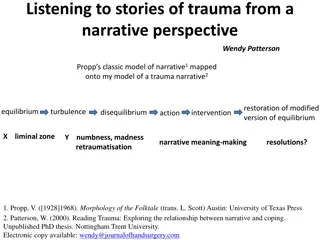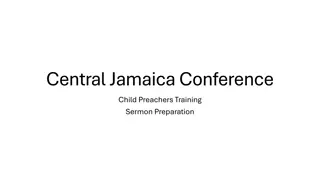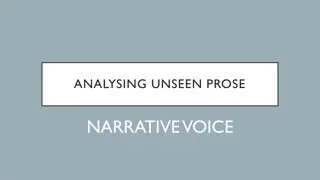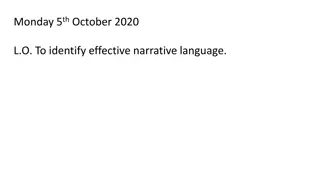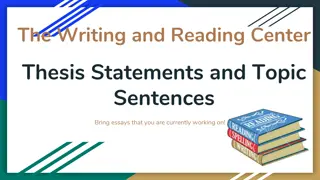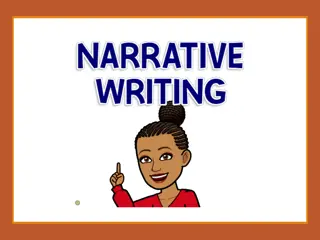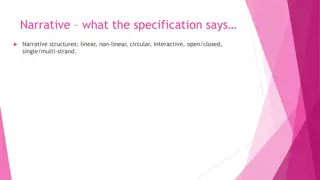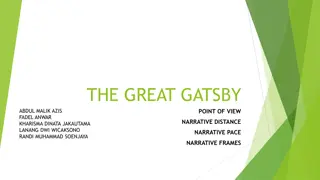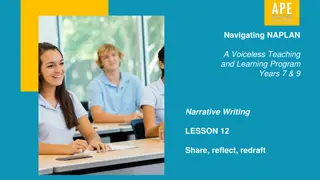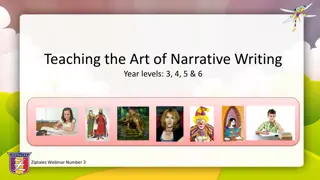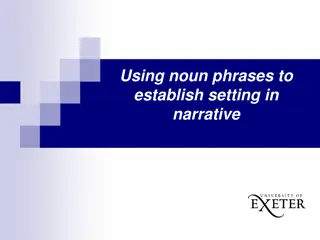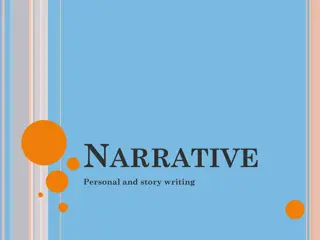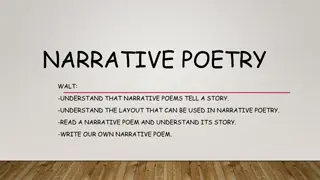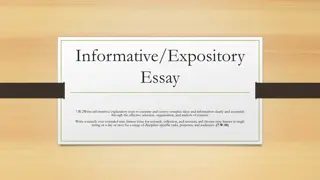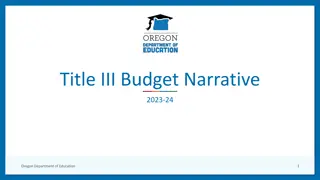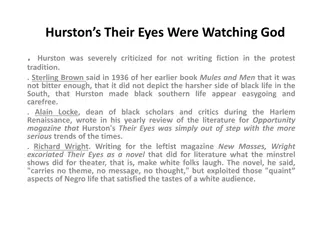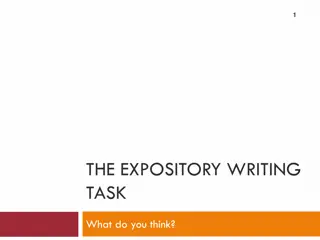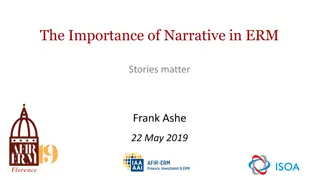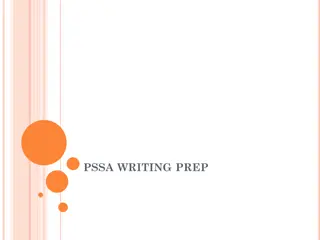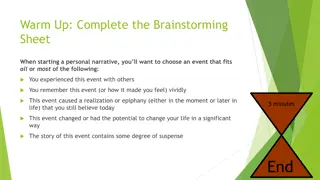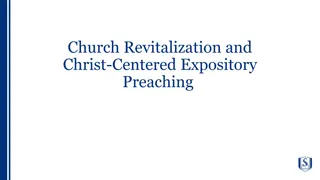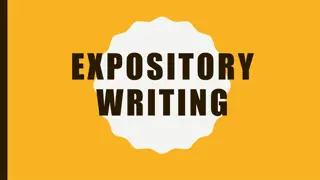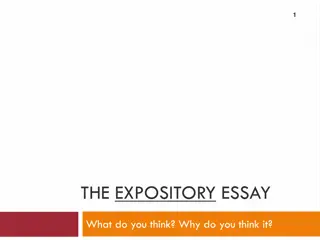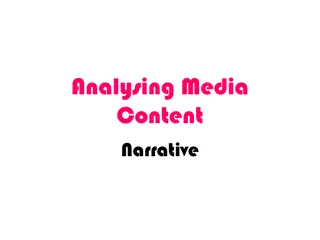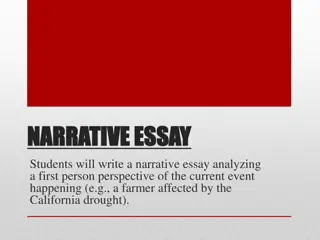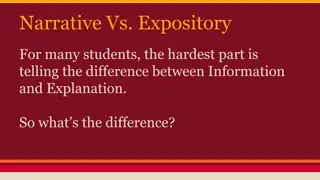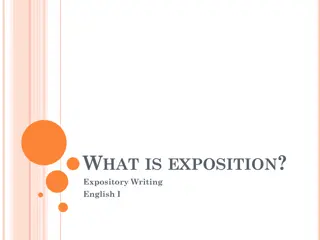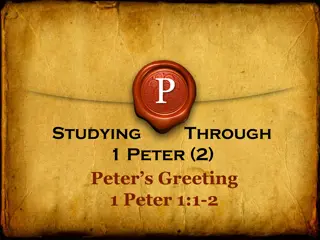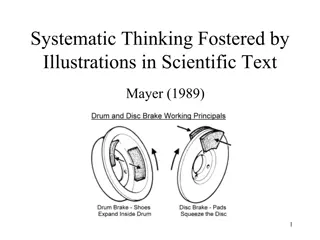MCAS ELA Narrative Essay Expectations and Examples
Learn about the expectations for MCAS ELA narrative essays, including guidelines for idea development and conventions. Find out how to score well by responding in the correct writing mode and avoiding common mistakes. Explore examples of lower-score responses and how to improve them. Download sample
3 views • 10 slides
Understanding Trauma Narratives: A Narrative Perspective
Exploring trauma narratives through the lens of Wendy Patterson Propp's classic narrative model, this study delves into the restoration of equilibrium, the disruption of disequilibrium, and the intervention actions within the liminal zones of trauma narratives. It emphasizes narrative meaning-making
5 views • 5 slides
Understanding Sermons: Types, Preparation, and Structure
Explore the significance of sermon preparation, types of sermons (expository, topical, narrative), key sermon components, and essential tips for sermon preparation.
1 views • 12 slides
Understanding Narrative Perspective in Unseen Prose Narratives
Explore the narrative voice in unseen prose narratives through the analysis of different narrative perspectives, such as homodiegetic and heterodiegetic narrators. Understanding these terms helps in interpreting the impact of perspective on storytelling and themes in literary texts for exam preparat
1 views • 17 slides
Exploring Effective Narrative Language for Writing Success
Delve into the art of crafting compelling narratives by identifying and utilizing effective narrative language techniques. Explore the elements that make a good narrative, practice identifying literary techniques, and understand the impact of figurative language on storytelling. Enhance your writing
0 views • 42 slides
Mastering Thesis Statements for Effective Essays
Understand the essence of a thesis statement - the core of your essay. Learn to craft thesis statements based on the type of paper you are writing - analytical, expository, or argumentative. Explore examples and essential questions to refine your thesis effectively.
1 views • 12 slides
Exercise in Narrative Style Transformation
Practice transforming narrative styles in storytelling through a series of examples where dialogues are rewritten into narratives. The exercises focus on changing direct speech into indirect speech while maintaining the essence of the original conversations. Each task presents a scenario followed by
1 views • 26 slides
Mastering Narrative Writing: Techniques and Sequences
Enhance your narrative writing skills by engaging readers with compelling characters and settings, developing well-structured event sequences, and utilizing descriptive details and narrative techniques effectively. Explore different points of view and learn to create engaging narratives that captiva
1 views • 23 slides
Understanding Narrative Research Design in Qualitative Research
Narrative research is a qualitative research approach that focuses on sharing individuals' stories. Researchers collect and interpret personal narratives to understand individual experiences. Key characteristics, data collection methods, steps, and ethical considerations in narrative research are ex
0 views • 20 slides
Unleashing Creativity Through Writing
Explore the essence of creative writing as a means to express thoughts, emotions, and opinions. Delve into the various forms, techniques, and genres of creative writing, from poetry and plays to expository and persuasive writing. Embrace the freedom and power of literary devices to craft compelling
1 views • 23 slides
Understanding Narrative Structures in Media: Linear vs. Non-Linear
Explore the concepts of linear and non-linear narrative structures in media storytelling, analyzing how they are used to engage audiences effectively. Dive into well-known stories like Alice in Wonderland, Hansel and Gretel, and Jack and the Beanstalk to understand the difference between narrative a
0 views • 17 slides
Understanding Narrative Elements in "The Great Gatsby
Explore the narrative elements in "The Great Gatsby" such as point of view, narrative distance, and narrative pace. The novel is analyzed from chapters 5 to 9, focusing on Nick Carraway's first-person perspective and the small narrative distance, which adds realism to the story.
0 views • 11 slides
Understanding Narrative Techniques for Effective Storytelling
Explore different narrative techniques like first-person perspective, flashback, framed narrative, foreshadowing, and in medias res to enhance your storytelling skills. Learn how these techniques can bring depth and complexity to your narratives, captivating your audience with engaging storytelling
3 views • 13 slides
Understanding the Art of the Short Story
A short story is a concise narrative that captivates readers with a focused theme and structured plot. This literary form demands unity of purpose and a single informing idea, distinguishing it from a novel. Various perspectives exist on the composition of a short story, with debates on its length,
1 views • 10 slides
NAPLAN Year 7 & 9 Narrative Writing Lesson: Share, Reflect, Redraft
Explore a voiceless teaching program for NAPLAN Years 7 & 9 narrative writing in Lesson 12. Dive into assessment criteria, NAPLAN minimum standards for Year 7 and 9, and resources from the National Assessment Program. Enhance your narrative writing skills through sharing, reflection, and redrafting.
0 views • 5 slides
Mastering Narrative Writing: Tips for Year Levels 3-6
Dive into the art of narrative writing focusing on Year Levels 3 to 6. Explore the importance of narratives in children's lives, the inclusion of narrative in the Australian Curriculum, understanding what truly constitutes a story, and engaging activities to spark creativity in students.
0 views • 25 slides
Understanding Narrative Stories and Plot Structure
A narrative text is a story composed of various elements such as characters, setting, conflict, events, climax, and resolution. The structure of a narrative story can be dissected into parts like beginning, middle, and end, each serving a specific purpose in storytelling. By plotting the story on a
0 views • 13 slides
Understanding Author's Purpose in Writing
Explore the various purposes authors have when writing, such as entertaining, informing, persuading, or satirizing. Learn how the choice of writing style reflects the author's intent, whether through narrative, descriptive, persuasive, or expository writing. Discover clues in titles, prefaces, and t
0 views • 37 slides
Exploring Setting Through Noun Phrases in Narrative Descriptions
Establishing setting in narrative through the use of descriptive noun phrases is crucial for creating a vivid and immersive atmosphere. By carefully selecting and arranging nouns, authors can evoke specific moods and engage readers in a detailed visual experience. This approach enhances the overall
1 views • 6 slides
Intriguing Narrative Journey
The session explores narrative writing, correcting sentences into past tense, discussing opening lines, successful narrative ingredients, and a gripping excerpt. Engage with the power of storytelling and honing writing skills through creative challenges and analysis.
0 views • 73 slides
Mastering Narrative Writing: Techniques and Tips
Dive into the world of narrative writing with this comprehensive guide! Learn the nuances of crafting fictional and personal stories, explore dialogue techniques, understand the structure of a narrative, and enhance your writing with impactful vocabulary. Whether you're a beginner or seeking to refi
0 views • 20 slides
Dive into Narrative Poetry
Explore the essence of narrative poetry by understanding its storytelling nature, layout, features, and common poetry techniques. Delve into an example poem, "Skippy the Naughty Kangaroo," to grasp the main characters, narrative elements, and the story it conveys. Through this journey, you'll enhanc
0 views • 11 slides
Mastering the Art of Expository Essay Writing
The expository essay is a powerful genre that involves investigating ideas, evaluating evidence, and presenting arguments clearly. Key components such as the thesis statement, topic sentences, and transitions are crucial for crafting a logical and compelling expository essay. Understanding these ele
0 views • 15 slides
Budget Narrative for Title III Grants in Oregon Education 2023-24
This budget narrative outlines the goals of Title III grants for the Oregon Department of Education, focusing on aiding English learners in attaining language proficiency and academic achievement. It emphasizes the importance of Supplement not Supplant regulations to ensure proper fund allocation an
0 views • 38 slides
The Complexity of Narrative Voices in "Their Eyes Were Watching God
Zora Neale Hurston's novel "Their Eyes Were Watching God" faced criticism for not conforming to traditional protest literature styles. The narrative features a compelling protagonist, Janie Crawford, who defies stereotypes of black women in literature. Hurston skillfully employs a dual narrative sty
0 views • 8 slides
The Significance of Prioritizing Others Over Self: An Expository Exploration
Explore the concept of prioritizing others over oneself through the lens of Jonas Salk's selfless actions in developing the polio vaccine. Reflect on whether individuals should focus more on the well-being of others or themselves, emphasizing the importance of selflessness in a society. Examine the
0 views • 14 slides
The Power of Narrative in ERM and Economics
Narrative plays a crucial role in risk management, as it helps in better understanding and decision-making. The use of stories in risk dashboards and economic narratives can convey complex information effectively. Robert Shiller's concept of narrative economics explores how popular stories impact ec
0 views • 27 slides
Mastering PSSA Writing: Overview of Written Responses & Essay Formats
Enhance your PSSA writing skills by exploring the three main types of written responses - Expository, Argumentative, and Narrative. Dive into the specifics of Expository Writing, including Illustration, Classification, Cause/Effect, Compare/Contrast, and Process. Each type is explained with clear ex
0 views • 15 slides
Personal Narrative Brainstorming for Engaging Storytelling
Start your personal narrative journey by selecting an event that resonates with significant aspects of personal experience and emotional impact. Explore shared experiences, vivid memories, realizations, potential life-changing moments, and elements of suspense to craft a compelling story. Engage in
0 views • 26 slides
Importance of Expository Preaching in Church Revitalization
Expository preaching, as advocated by influential figures like John MacArthur, Mark Dever, and J.I. Packer, is highlighted as essential for conveying divine revelation faithfully and effectively applying Scripture to the lives of believers. The practice of expository sermons is essential for the hea
0 views • 19 slides
Mastering Expository Writing: Understanding Different Patterns
Expository writing is a form of writing used to explain, describe, inform, or give information. It is structured around a single topic and developed according to specific patterns. This type of writing includes description, sequencing or processes, and comparison/contrast. Through examples and cue w
0 views • 12 slides
The Power of Expository Writing: Importance and Impact
Expository writing is essential for clear communication and expressing thoughts effectively through written words. This form of writing helps convey ideas, information, and opinions concisely, making it crucial for academic, professional, and personal communication. The structure of expository writi
0 views • 30 slides
Engaging Narrative Writing Challenges for Year Six Students
Delve into a captivating narrative featuring Louisa, Miss Larkin, and Mr. Spencer. Explore the use of figurative language, relative clauses, and emotive language in a mysterious and dramatic setting. Follow the challenges outlined to enhance your storytelling skills with similes, personification, me
0 views • 6 slides
Understanding Narrative Structures in Media Content
Narrative in media content involves how stories are told, focusing on structure and conventions. Key elements include Todorov's narrative theory, basic narrative structures, and Propp's character spheres of action, all of which shape the way stories unfold in films and other media.
0 views • 13 slides
Crafting a First-Person Perspective Narrative Essay
Explore the art of crafting a narrative essay from a first-person perspective, delving into the essence of storytelling through vivid details and character reflections on current events. Learn narrative techniques and guidelines for structuring compelling narratives, all through the lens of personal
0 views • 31 slides
Understanding the Difference Between Narrative and Expository Writing
Differentiating between narrative and expository writing can be challenging for many students. This content explores the distinctions between narrative stories like "Little Red Riding Hood" and expository pieces, touching on concepts such as the shapes of stories and the structure of essays. Quotes
0 views • 8 slides
Understanding Expository Writing: Exposition and Thesis Statements
Expository writing involves explaining, describing, and discussing a topic through a structured essay format. It centers around a clear thesis statement supported by evidence. Learn about crafting effective thesis statements and differentiating between strong and weak examples.
0 views • 12 slides
Mastering Expository Writing with the Keyhole Essay Method
Master the art of expository writing through the Keyhole Essay method, which emphasizes focus, organization, and clarity. This guide covers the Keyhole Essay concept, when to use it, characteristics of expository writing, and tips for crafting a strong introduction with a solid thesis statement.
0 views • 15 slides
Expository Study of 1 Peter: Themes of Endurance and Holy Living
In this expository study of 1 Peter, we delve into the themes of endurance and holy living as Peter encourages his readers, emphasizing the importance of enduring suffering and living a life of submission. The background information sheds light on the origin of the dispersed churches to whom Peter w
0 views • 22 slides
Effects of Illustrations on Systematic Thinking in Expository Text Understanding
Understanding how illustrations impact the development of mental models when processing expository text is explored in Mayer's study. The experiment with novice college students shows that text paired with illustrations promotes better recall and transfer of explanatory information compared to text
0 views • 15 slides
